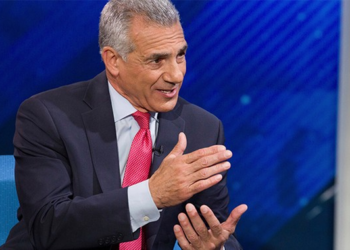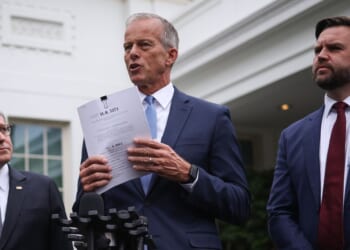
Bradley Tusk is a rich man who lives in New York City. WIRED magazine described him as a “political consultant and fixer for companies like Uber fending off regulation. He’d made a fortune doing that (early Uber stock helped a lot), and he was eager to spend a good chunk of it pursuing online voting technology.”
Just recently, Tusk made no secret of his support for Zohran Mamdani in his campaign to become New York’s mayor.
CEO BRADLEY TUSK supports Zohran even though he’ll raise his taxes, warns fellow millionaires: ‘If we’re not careful, we’ll end up with Elon and 25 trillionaires and unemployment at 19% – that just means the French Revolution.” pic.twitter.com/VeZCCgTRiD
— The Tennessee Holler (@TheTNHoller) November 6, 2025
Tusk and his venture, called Mobile Voting Foundation, just released what WIRED described as “a cryptography-based protocol that seeks to help people securely cast their votes on iPhones and Androids.” In plain English, that means Tusk wants you to vote by phone, says he has the technology to do it, and wants you to trust him.
His platform is called VoteSecure. Its developers are with an organization called Free & Fair, and they describe the new tech as “an open source cryptographic voting protocol…VoteSecure is sponsored by The Mobile Voting Foundation and provides a transparent, evidence‑backed foundation that others can safely build upon.”
Free & Fair exists to usher in a new era of provably secure, verifiable elections. We build high‑assurance, open source systems and provide verifiable evidence of their correctness and security. This release reflects that mission: rigorous engineering, open code and models, and a foundation designed for hardware independence and public review. We’re excited to share it with election officials, vendors, researchers, and the broader community,” the developers said on their website in announcing the initial release of the technology.
When developers use terms like “open source,” they are talking about technology whose source code is made publicly available to anyone to view, use, modify, share and redistribute. This makes it possible for independent developers to see how the software works, modify it, share it, and improve it.
There is a common myth that OpenAI’s ChatGPT is open source, but it is not. The reasons it’s not, and this is important to remember when talking about Tusk’s new tech, is that OpenAI wanted to keep its tech models closed due to safety concerns, regulatory and compliance issues, intellectual property protection, and misuse. Do those same concerns apply to Tusk’s mobile voting technology?
Since any software engineer will run circles around me, I won’t debate the safety or security of Tusk’s open source technology. Instead, I’ll put it this way, would you trust a new platform where you can vote using your smart phone, and once you press “send,” your vote will secure and counted? Further, would you trust that this same technology can’t or won’t be manipulated by some human being who wants to put their digital thumb on the scale of ballot counting?
Know Who’s Involved
Since I’ve spent the past few decades in communications, I’m decidedly a word guy who focuses on the human dynamics of a given situation. So, I usually assess a situation based on the facts at hand, the words and language used to describe it, and most importantly, the people who are involved.
You can know what’s happening and still know nothing. But more importantly, you have to know who’s involved, what they want, and what tools they have at their disposal to achieve what they want.
Tusk is a former staffer for Chuck Schumer and Michael Bloomberg, and other left-leaning politicians. One of his skills is to convince local authorities across the country to do such things as let Uber operate in their towns, allow on-demand delivery for marijuana, and eliminate regulations that restrict the sale of online insurance for homeowners and renters.
From a business perspective, his pattern is to eliminate barriers so that technology can change the way local towns and societies function. From a political perspective, his pattern is to advocate for outcomes that tend for favor leftist positions on issues.
Back in 2018, long before the 2020 pandemic and an upside-down election, The New Yorker, which is not exactly a right-wing media outlet, took a deeper look at Tusk’s vision for mobile voting. It reported that “nearly ninety-five per cent of American adults own mobile phones, and rely on them for all sorts of secure transactions. Using them to cast a ballot would seem to be a natural extension, and one that removes many of the impediments that discourage people from voting, such as inconveniently located polling places, limited hours, and long lines.”
But then The New Yorker cited a 2010 case where authorities in Washington, D.C., had been exploring the idea of an internet-voting system, so they brought in a University of Michigan computer-science professor named J. Alex Halderman, along with his students. They wanted them to test the security of the system.
The group found its first vulnerability ‘after a few hours of examination’ and eventually took control of the system; officials only noticed the breach thirty-six hours into the hack. ‘Securing Internet voting in practice will require significant fundamental advances in computer security,’ Halderman’s team concluded in an academic paper detailing their exploits. ‘We urge Internet voting proponents to reconsider deployment until and unless major breakthroughs are achieved.’
That was then, I’m sure Tusk will tell you, ‘but this is now,’ and things have changed.
As an information consumer, I know when someone’s trying to BS me. So on issues like mobile voting, I focus on how someone is trying to sell me on something, and I look for the obvious red flags. If my ‘manipulation radar’ is sending loud signals to me, I give that some weight.
Is The Real Problem Turnout, or Something Else?
With that in mind, I can’t help but notice that in trying to sell his vision for mobile voting, Tusk tries to place all the focus on voting patterns and blames low turnout in off-year and primary elections as democracy’s real problem. That’s debatable, in my mind, and I’ll get to that in a bit. But the little game Tusk is playing with this form of persuasion is to get you to take your eye off of the ball, the ball being the safety and reliability of his technology and the merits of it as a solution. And whether there is a problem that requires his solution.
He tries to close the sale simply by offering that if a technology can increase the total number of digital ballots cast, then democracy benefits.
The Democrats take this approach to nearly every debate on an issue. They will cite a problem, real or imaginary, and they will frame Republicans’ disagreement on the issue as total denial that the problem they cited exists. They need to establish that the often mischaracterized problems they cite are real, and that’s where they spend the bulk of their time and attention. Once they get the public to concede the problem exists, their ‘solution’ is the only course of action. To find fault with that solution is to deny the societal problem exists. This becomes a circular debate until the left wears you down, gets everyone to accept the problem might exist and their solution is the only way.
This is how they’ve convinced local school districts across the country to surrender to their efforts to put boys in girls’ locker rooms and restrooms.
So, when Tusk talks about his mobile voting technology, by default he doesn’t talk much about the tech itself but rather, voting patterns in primaries and off-year elections, where turnout is an issue. If we agree that higher turnout is better, is that because right now it’s too hard to vote, or is it because the real issue is voters themselves are under-motivated, uninterested in self-governance, and uninformed? Tusk wants to make it a convenience issue. Higher numbers are his primary measure of a healthy election, even if more and more voters don’t even know why they’re voting or what they’re voting for (or against).
When Tusk talked to WIRED, he said his strategy is to, “Start small—city council, school board, maybe mayor…Prove the thesis. The odds of Vladimir Putin hacking the Queensborough election seems pretty remote to me.”
Tusk wants you to agree that turnout is the real problem in need of his solution, and when it comes to that solution, trust him with the details. It’s all good. The tech will work, the tech is secure. Elections won’t be rigged. Trust him. The main thing is we just need more votes overall.
MOBILE VOTING: “Tusk argued increased turnout through mobile voting will incentivize them to work together and institute reforms that cater to a greater % of the population.” https://t.co/DIw58OkF64
Entrenched interests will oppose this, but it is worth taking seriously.🇺🇸 pic.twitter.com/64Nq8XhhMg
— The Tennessee Holler (@TheTNHoller) September 23, 2024
If you ever took civics before, think about that sort of logic for a second. If it becomes as easy to vote in elections as it is to order a pizza, is that really good for self-governance? Shouldn’t there be certain checks and balances to ensure voters are at a minimum somewhat informed and actually motivated to vote? Until now, the basic effort involved was a simple test to ensure voters who cast ballots at least put some time and thought into their votes. Mobile voting would eliminate time and thought as barriers to voting. And that doesn’t even touch on the security aspects.
Voting Should Require Some Effort
This leads to a question Tusk seems likely to reject outright: Will making voting so casual that you can literally do it instantly and without thinking lead to better and more fruitful elections? Is that really what the democratic process is about, ease and convenience? I’d say, ‘no.’ Tusk seems to think it is, however.
In a world where mobile voting rules, elected officials will be mere influencers. While there may be more votes counted, fewer and fewer voters will actually take the time to research the candidates, think about the issues, and physically make the effort to vote. In effect, voting will be too easy, and the results could be calamitous.
There’s something to be said for a voter who goes to the polls to vote. That’s someone who had to at least make some conscious decisions on the election before casting a ballot. But in Tusk’s world, voting will no longer require any thought. Just impulse.
Tusk does have his detractors.
Reported WIRED: “The loudest objections against mobile or internet voting come from cryptographers and security experts, who believe that the safety risks are insurmountable…Ron Rivest is the legendary ‘R’ in the RSA protocol that protects the internet, a winner of the coveted Turing Award, and a former professor at MIT. His view: Mobile voting is far from ready for prime time. ‘What you can do with mobile phones is interesting, but we’re not there yet, and I haven’t seen anything to make me think otherwise,’ he says, ‘Tusk is driven by trying to make this stuff happen in the real world, which is not the right way to do it. They need to go through the process of writing a peer-reviewed paper. Putting up code doesn’t cut it.’”
Another data scientists WIRED consulted was David Jefferson who said Tusk’s venture is “doomed.”
He said, “I’m willing to concede rock-solid cryptography, but it does not weaken the argument about how insecure online voting systems are in general. Open source and perfect cryptography do not address the most serious vulnerabilities.”
Whether you come at mobile voting from the issue of system security, or from the perspective of how even a secure mobile voting platform would have on the make-up of the electorate, the dangers are real. Republicans need to be prepared for this because it won’t happen all at once. It will creep into the system through local elections and follow the path of least resistance until we have a serious problem with our national elections. The time to address this is now.
No matter what day it is, you can count on the left to try to gaslight you and everyone else into thinking what’s real isn’t, and what isn’t real is. PJ Media’s VIP membership gives you the best way to see through all of it, and we will give you some great arguments if you find yourself in a friendly debate with your leftist brother-in-law. Join the fight! Use promo code FIGHT to get 60% off your VIP membership.















